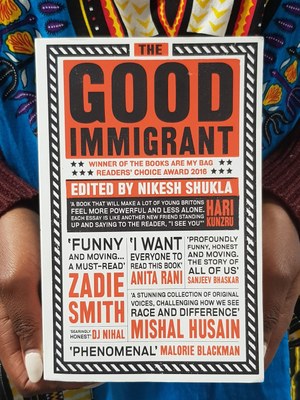As part of our Black History Month celebrations, and to launch our new Read At Leicester texts, the Library hosted a series of book clubs called LitLunches. Every Monday in October, students and staff met for an hour to discuss a specific essay from The Good Immigrant (2016), and here’s a quick summary of some of the conversations we had!

Week 1: “Forming Blackness Through A Screen” by Reni Eddo-Lodge
We kicked off our LitLunches series with a conversation about the importance of getting on-screen representation right. There was a lot of talk in the room about “The Fresh Prince of Bel-Air”, which Eddo-Lodge references heavily in her essay, and how the show does play into respectability politics. The conversation moved to the lack of diverse representation in British TV. We concluded by agreeing that on-screen representation does matter, and has the ability to heavily influence young people. For this reason, representations of blackness need to be nuanced, varied, and not rely on any lazy stereotypes.
Week 2: “A Guide to Being Black” by Varaidzo
Dr Furaha Asani facilitated this week’s book club, and took us through a wonderful hour of conversation wherein we discussed each of the sections in the chapter: “The One-Drop Rule”, “Black Hair”, “The N Word”, and “The Performance”. In this session, some participants admitted that they had never considered the politicisation of black hair, and were humoured by the idea. Other participants thought that the use of the n word in popular music gave everyone a right to its use. Dr Asani was respectful of all opinions as the facilitator of this session, but eloquently addressed those that were more problematic. Whilst the conversation did get quite heated and contentious, it highlighted the need to facilitate more conversations across campus that address ignorance and harmful opinions.
Week 3: “Cutting Through (On Black Barbershops and Masculinity)” by Inua Ellams
I lead this week’s session on one of my favourite essays in the collection. Whilst all participants appreciated the essay’s insight into the geopolitics between African nations, and the nuances between the many cultures that exist on the continent, we did agree that the essay could have done more in the way of an exploration of masculinity. Through Ellams’ write-up of his travels across the African continent, it stressed again the downfall of approaching blackness as a monolith. The barbershop cultures vary dramatically depending on the country Ellams’ visits, and Ellams’ paints a picture of them as important safe spaces for men. In our hour-long session, we wondered whether hairdressers functioned in a similar way for women, and also whether the barbershop culture in the UK varied regionally.
Week 4: The Good Curriculum and Why Representation Matters
We rounded off our LitLunches schedule with a conversation facilitated by our SU Education Officer Azza. In this session, we discussed The Good Immigrant collection as a whole, and considered both its merits and limitations. Participants spoke about their favourite essays as well as those that troubled them. We spoke about The Good Immigrant as a text that could potentially be used as course material, and many of us expressed our desires for the book to be more widely read across campus, because of the variety of voices it offers. We used our discussion of the text to initiate a wider conversation about higher education, and the need for an inclusive university and curriculum.
The conversations that were had in these sessions were highly entertaining and informative. I came away from the series feeling inspired by people’s openness to the discussions, and determined to keep the conversations going. Creating spaces for frank and open discussions about race are incredibly important, particularly in big institutions like the University. The Good Immigrant provides us with the opportunity to talk about race through the personal reflections of the authors in the collection, and confront our own ignorance and bias.